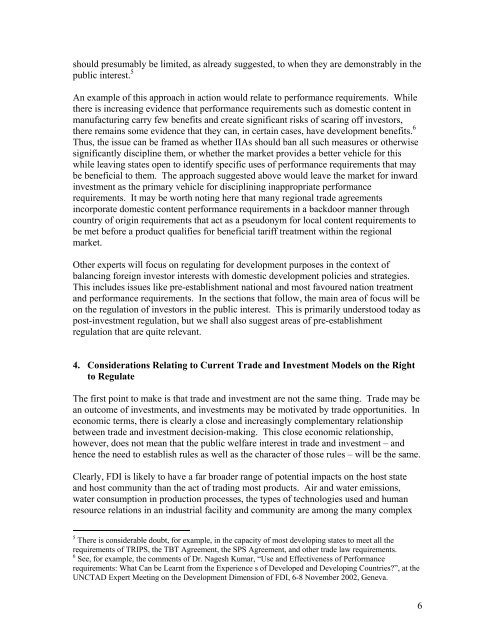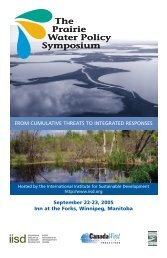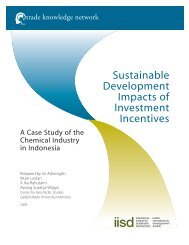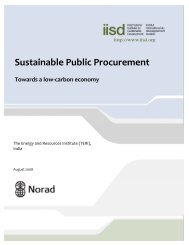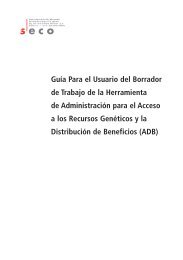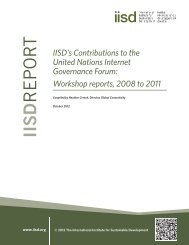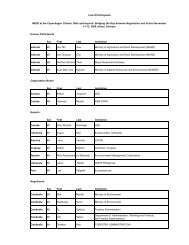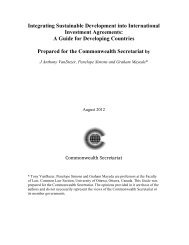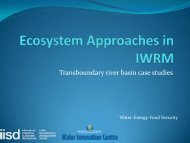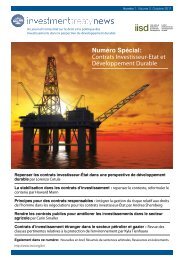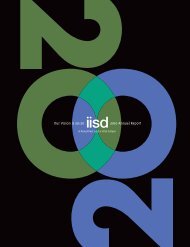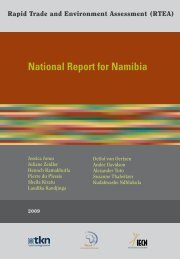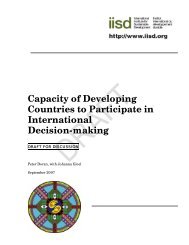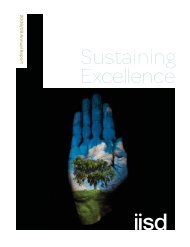The Right of States to Regulate and International Investment Law
The Right of States to Regulate and International Investment Law
The Right of States to Regulate and International Investment Law
You also want an ePaper? Increase the reach of your titles
YUMPU automatically turns print PDFs into web optimized ePapers that Google loves.
should presumably be limited, as already suggested, <strong>to</strong> when they are demonstrably in the<br />
public interest. 5<br />
An example <strong>of</strong> this approach in action would relate <strong>to</strong> performance requirements. While<br />
there is increasing evidence that performance requirements such as domestic content in<br />
manufacturing carry few benefits <strong>and</strong> create significant risks <strong>of</strong> scaring <strong>of</strong>f inves<strong>to</strong>rs,<br />
there remains some evidence that they can, in certain cases, have development benefits. 6<br />
Thus, the issue can be framed as whether IIAs should ban all such measures or otherwise<br />
significantly discipline them, or whether the market provides a better vehicle for this<br />
while leaving states open <strong>to</strong> identify specific uses <strong>of</strong> performance requirements that may<br />
be beneficial <strong>to</strong> them. <strong>The</strong> approach suggested above would leave the market for inward<br />
investment as the primary vehicle for disciplining inappropriate performance<br />
requirements. It may be worth noting here that many regional trade agreements<br />
incorporate domestic content performance requirements in a backdoor manner through<br />
country <strong>of</strong> origin requirements that act as a pseudonym for local content requirements <strong>to</strong><br />
be met before a product qualifies for beneficial tariff treatment within the regional<br />
market.<br />
Other experts will focus on regulating for development purposes in the context <strong>of</strong><br />
balancing foreign inves<strong>to</strong>r interests with domestic development policies <strong>and</strong> strategies.<br />
This includes issues like pre-establishment national <strong>and</strong> most favoured nation treatment<br />
<strong>and</strong> performance requirements. In the sections that follow, the main area <strong>of</strong> focus will be<br />
on the regulation <strong>of</strong> inves<strong>to</strong>rs in the public interest. This is primarily unders<strong>to</strong>od <strong>to</strong>day as<br />
post-investment regulation, but we shall also suggest areas <strong>of</strong> pre-establishment<br />
regulation that are quite relevant.<br />
4. Considerations Relating <strong>to</strong> Current Trade <strong>and</strong> <strong>Investment</strong> Models on the <strong>Right</strong><br />
<strong>to</strong> <strong>Regulate</strong><br />
<strong>The</strong> first point <strong>to</strong> make is that trade <strong>and</strong> investment are not the same thing. Trade may be<br />
an outcome <strong>of</strong> investments, <strong>and</strong> investments may be motivated by trade opportunities. In<br />
economic terms, there is clearly a close <strong>and</strong> increasingly complementary relationship<br />
between trade <strong>and</strong> investment decision-making. This close economic relationship,<br />
however, does not mean that the public welfare interest in trade <strong>and</strong> investment – <strong>and</strong><br />
hence the need <strong>to</strong> establish rules as well as the character <strong>of</strong> those rules – will be the same.<br />
Clearly, FDI is likely <strong>to</strong> have a far broader range <strong>of</strong> potential impacts on the host state<br />
<strong>and</strong> host community than the act <strong>of</strong> trading most products. Air <strong>and</strong> water emissions,<br />
water consumption in production processes, the types <strong>of</strong> technologies used <strong>and</strong> human<br />
resource relations in an industrial facility <strong>and</strong> community are among the many complex<br />
5 <strong>The</strong>re is considerable doubt, for example, in the capacity <strong>of</strong> most developing states <strong>to</strong> meet all the<br />
requirements <strong>of</strong> TRIPS, the TBT Agreement, the SPS Agreement, <strong>and</strong> other trade law requirements.<br />
6 See, for example, the comments <strong>of</strong> Dr. Nagesh Kumar, “Use <strong>and</strong> Effectiveness <strong>of</strong> Performance<br />
requirements: What Can be Learnt from the Experience s <strong>of</strong> Developed <strong>and</strong> Developing Countries?”, at the<br />
UNCTAD Expert Meeting on the Development Dimension <strong>of</strong> FDI, 6-8 November 2002, Geneva.<br />
6


